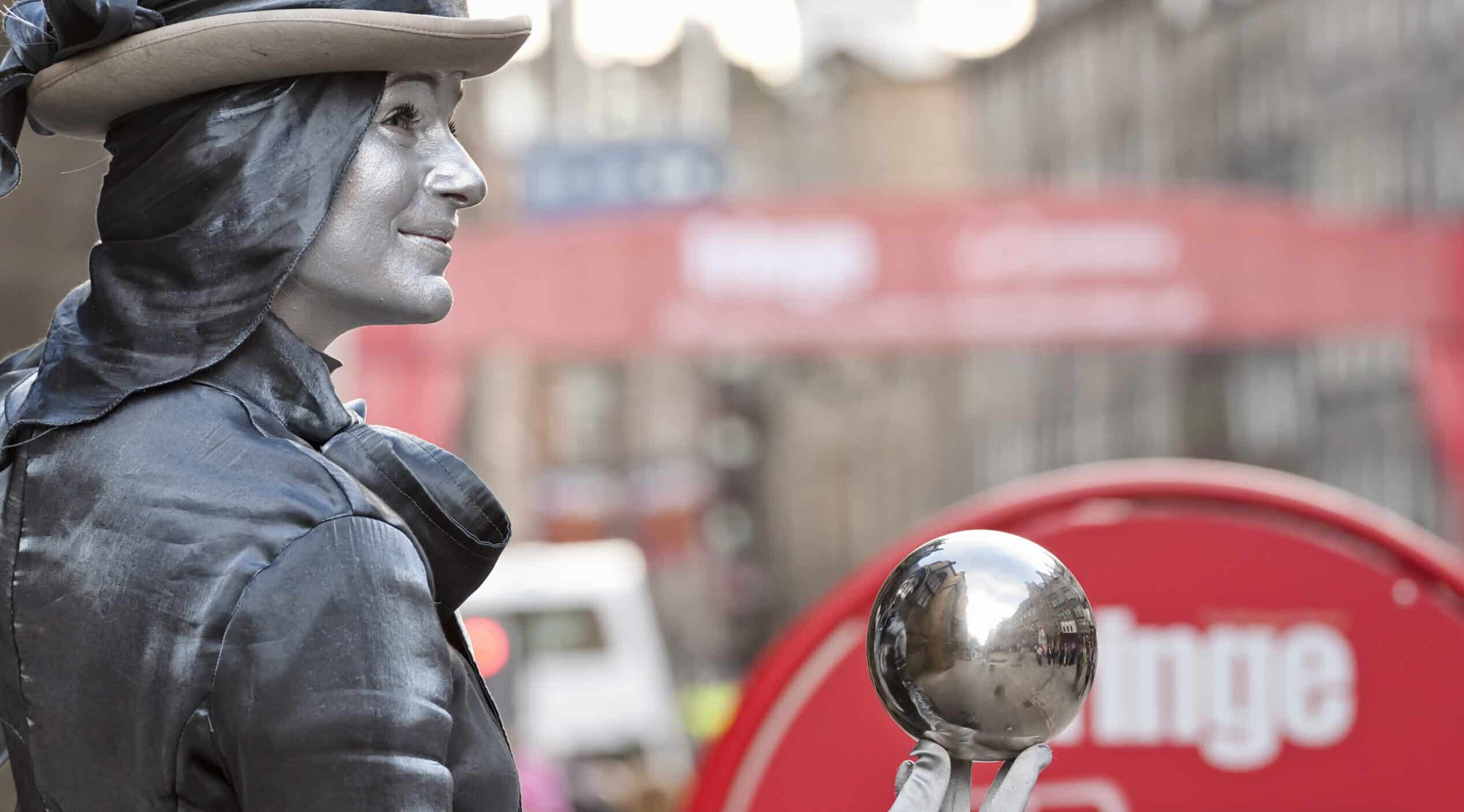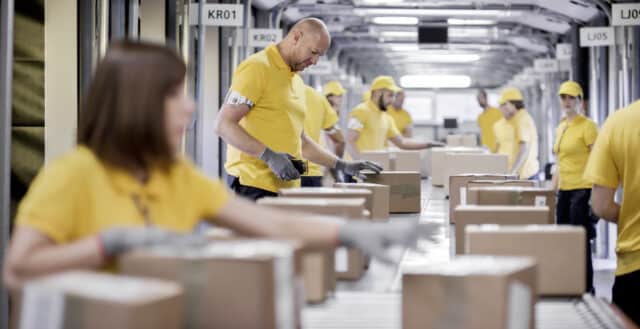
Many a famous face got their first big break at the Edinburgh Fringe Festival: Steve Coogan, Noel Fielding, Graham Norton, Rowan Atkinson, Miranda Hart, Alan Rickman (proving it’s not just about comedy), Mel & Sue, Stephen Fry, John Cleese, and even the late, great Robin Williams.
And that’s just a few names – the list goes on and on.
Another prime example of the success that can result from appearing at the Fringe is the award-winning TV show, Fleabag – the result of producer Francesca Moody and actress Phoebe Waller-Bridge bringing their one-woman comedy play to Edinburgh.
So, it’s not hard to see the attraction of performing at the festival for the new wave of talent coming through. For many, this could be their one chance to get spotted and find the stardom that could ultimately change their life.
But that search for stardom comes at a cost.
The entire festival runs for a lengthy four weeks, and performers staying for the entire duration can expect to run up costs of more than £3,600 in that time, just to live and get by in Edinburgh, according to recent Indeed Flex research.
That does, of course, seem like a significant sum, but when you take into account that prices skyrocket in the city during that time, budget accommodation can cost between £2,000 to £3,000 across August. Add into the mix a daily meal out, and you’re looking at an additional £620 on top of that figure.
Many would argue that it’s worth it, to be on stage, doing what they love – performing to an audience – with a shot at the big time. But although there’s a hefty price tag attached to that, there is – to coin a cliche – light at the end of the tunnel.
With almost 2.5m ticket to the festival sold last year, and even more attendees expected this year, that’s a lot of hungry and thirsty people who’ll need to be sated. This means that there are thousands of temporary jobs at Edinburgh Fringe Festival, just waiting to be filled.
In particular, there are a number of hospitality jobs at the Fringe Festival, Edinburgh: think bar work, waiting staff roles, and events venue roles in general.
And, as a leading platform for temporary jobs, Indeed Flex can help you to find part-time jobs at the Edinburgh Fringe Festival, to ensure you spend a bit more time worrying about polishing your act than your outgoing costs.
It’s certainly worth considering, as temporary bar work pays an average of £12.62 per hour during festival season, so taking on just four four-hour shifts per week, during your off-stage time, can earn you £807 towards your living costs.
While it won’t offset all of those costs, it will certainly go a fair way towards reducing them.
So, now that we’ve established that there are plenty of work opportunities during Edinburgh Fringe, to ease the financial burden, we’re going dive a little deeper into the expenses associated with participating at the event; the importance of budgeting; the type of temporary job opportunities available during festival season; the benefits of that sort of work; alternative sources of funding for performers; and time-management when both performing and working.
So, as they say – on with the show!
Understanding the financial landscape of the Edinburgh Fringe Festival
An overview of the expenses associated with participating in the festival
We’ve covered the accommodation and eating out costs already, in the intro to this post, but there are other costs that it’s worth thinking about if you’re going to perform at the Edinburgh Fringe. If you’re a seasoned pro, then you may well be aware of these costs. However, if you’re relatively new to the scene, it’s probably worth considering the following:
- Travel costs: If you don’t live in or near Edinburgh, then you’re going to have to pay to travel there and back, and possibly use public transport to get around the city while you’re there. It’s nigh on impossible to put exact figures on these costs, as it depends where you’re travelling from, what mode of transport you’re using, and how far in advance you book that transport. But factor in petrol costs if travelling by car, flight costs if travelling from within the UK (if you live far from Edinburgh) or from abroad, and the cost of train tickets if that’s your mode of transport. Also consider how you’ll get to and from the venues at which you’re performing, from your accommodation.
- Promotional materials: It may be that you wish to drum up more support, or gain a wider audience for your act, so you choose to invest in creating flyers, posters, or promotional materials to be distributed at the festival. If so, you’ll have to pay for a designer to produce those materials (unless you’re design-savvy yourself), pay for them to be printed, and – in the case of promotional materials – pay a supplier.
- Merchandise production: It depends how far down the line you are in your career, whether you already have a name for yourself, and whether you’re already ‘on the circuit’, but you may well want to create specific merchandise related to your show, such as t-shirts, DVDs, or other items. If so, you’ll need to factor in production costs for these and consider that some items may go unsold.
- Equipment rental: If your performance requires specific equipment not included by the festival (perhaps musical equipment, lighting equipment, or certain props that form part of your act), then be aware that renting it can add to your expenses.
- Fringe Society registration fee: Fees vary depending on the type of show you’ll be putting on and how long it is (full run vs. limited). They range from a few hundred to over a thousand pounds, so be prepared to absorb this cost or offset it in some way (seasonal jobs at the Edinburgh Fringe Festival are, as mentioned, one way to do this).
- Venue hire: Venue costs can also eat into any budget you’ve set aside for the festival. Fringe venues offer varying levels of production support, which will therefore affect the amount you’ll need to pay for this. Options range from basic performance spaces to fully-equipped theatres.
- Fringe Society ticket commission: The Fringe Society takes a commission on all ticket sales processed through their platform, so be aware that the price on each ticket is not the final amount you’ll receive (your ‘take-home pay’, as such).
So, those – along with accommodation, food, and drink costs – are the things you can expect to shell out for, but what about having a strict budget for your time at the Fringe, and trying to stick to it?
The importance of budgeting and financial planning for performers
While performing at the Fringe is a dream in itself for many, and finding fame is an added bonus (okay, maybe a bit more than that…), that dream can turn into something of a nightmare if you haven’t set a firm budget and some kind of financial plan ahead of your attendance.
The last thing you want to be worrying about, while you try to give it your all on stage, is running out of money, getting into debt, and potentially having to leave earlier than planned.
One thing is for certain: don’t rely solely on ticket and merchandise sales as a guaranteed revenue stream, as these can fluctuate, being affected by all sorts of things – other acts on at the same time, your profile and how well known you are, the great British weather… all manner of things.
So, money generated by ticket sales and merchandise can be your plan B, but you definitely need a plan A. So here are a few things you can do:
- Create a realistic budget, before you show up: Research past Fringe participant experiences, speak to current and former performers, and factor in all potential costs.
Create a spreadsheet which covers everything you’ll spend money on; travel, food, accommodation, equipment hire, venue hire… everything we’ve mentioned previously. - Also factor in potential income: ticket sales, merchandise sales, and any money from Edinburgh Festival jobs you plan to take on. But be conservative with your income estimates. As the saying goes; plan for the best, prepare for the worst. By laying out all of your costs, and potential income, up front, you’re far less likely to overspend.
- Track expenses like a bloodhound with a scent: Keep detailed records of literally every penny you spend, getting receipts for each purchase, if you can. Likewise, make a note of all revenue generated from your shows. Doing this will help you stay on track and identify areas for adjustment if needed.
- Streeeetch that budget: A budget helps identify areas for cost-cutting. For example, can you share accommodation, rather than stumping up for your own place? Can you promote your shows online, for free, instead of getting expensive flyers printed? Do you actually need that smoke machine or glitter cannon at your show – is it adding anything to your performance? Thinking in this way allows you to stretch your financial resources that little bit further.
- Managing cash flow: The Fringe – given that it’s four weeks long, is most definitely a marathon and not a sprint. Planning ahead, as mentioned in the tips above, helps you manage your cash flow throughout the festival, so that you have enough money for the essentials even if ticket sales are slow initially. And think: Do you need to go out for drinks after each show with fellow performers? Could you grab a quick bite to eat, rather than a full sit-down meal? Do you need that cool tartan sporran, or is it just another piece of tat from a tourist gift shop?
- Explore funding options: We’ll discuss this in more dertail further down this post, but it’s worth researching available grants, sponsorships, and considering crowdfunding campaigns, to supplement your budget.
- Consider alternative income streams: Outside of your on-stage performances at the Fringe, can you teach workshops, offer online performances, or sell digital products alongside the physical ones?
- Take on some temp work: It won’t surprise you that we suggest this, given the site you’ve landed on and what this post is about, but it’s definitely worth looking into work opportunities during Edinburgh Fringe. This gives you the chance to significantly boost what you earn, cover costs more easily, and offers a degree of flexibility in that you should be able to fit this work in outside of your performance commitments.
A solid budget, and all round sound financial planning, will ease your worries during the festival, allowing you to focus more on your performance(s) without the distraction of financial stress.
It also helps you to work out how you’d plan for future Fringe visits and whether there’s anything you’d change within that budget.
Exploring income opportunities beyond performance
Temporary employment options
An overview of the temporary job opportunities available during the festival season
So, this follows straight on from the previous point, and it’s pretty simple: if you’re looking for a temporary job at the Edinburgh Fringe Festival, you’ll find one.
Similarly, if you’re a business looking for reliable temporary staff to cover roles during the busy festival period, you can find them.
With anywhere between 2.5m – 3m visitors (not all at once, but across the whole festival) and 250 official festival venues alone, not counting the umpteen pubs, bars, restaurants, and hotels outside of those, there are a lot of people who need to be catered for in one way or another… and that means plenty of available work.
Edinburgh Fringe jobs are certainly not in short supply. We’ve split them up into festival-specific jobs and general jobs i.e. anywhere across Edinburgh.
Festival-specific jobs:
- Box office: These roles involve selling tickets, answering customer enquiries, and managing entry into gigs.
- Front of House: This could involve anything from greeting guests, checking tickets, ushering guests to their seats, and generally ensuring a smooth audience experience.
- Stage crew: This work involves a degree of physical fitness as you’ll be assisting with setting up and dismantling sets, operating lights and sound equipment, and supporting backstage logistics.
- Cleaning staff: This doesn’t need much explaining – you’d be responsible for maintaining the cleanliness of performance spaces and common areas.
- Stewards: Providing information and directions to festival-goers throughout the city.
- Catering and hospitality roles: With the huge influx of performers and festival-goers, there’s an increased demand for catering staff at event venues, restaurants, and pop-up food stalls.
- Merchandise and retail: Festival-related merchandise stalls or pop-up shops might need temporary staff for sales and customer service.
General roles, across Edinburgh:

- Bartending: Throughout the city, there are over 380 pubs and well over 400 bars, and there’ll be many thirsty patrons visiting those throughout the festival, so bartending is a pretty safe bet if you’re looking for hospitality jobs at Edinburgh Fringe.
- Waiting staff: There are nearly 900 restaurants in Edinburgh, and that’s outside of the festival itself, so, again, with plenty of hungry mouths to feed, you’re sure to find available waiting staff roles.
- Customer service – retail: There are actually so many shops in Edinburgh that we couldn’t get accurate stats on the exact number, but Princes Street alone is packed with large, well-known retailers, so customer service roles won’t be in short supply, with the increased demand from all those visitors.
- Hotel-based roles: There are 133 hotels in Edinburgh, ranging from small, boutique places to those which are part of large chains. With the surge in tourism that the festival brings, housekeeping staff will be in demand, as will various support staff.
- Delivery services: Increased demand for food and drink deliveries, right across the city, leads to the increased availability of temporary job opportunities with delivery companies.
There may be many other businesses offering temporary work opportunities outside of these roles, but that’s for you to explore. The ones we’ve mentioned above are simply those that seem to be most freely available during festival season.
You may even look to take on more than one type of role. If that’s the case, then it’s well worth reading our post on how to juggle multiple temporary jobs.
The benefits of temporary employment for performers
The benefits of taking on part-time jobs at the Edinburgh Fringe Festival, or temp work, are fairly obvious in the immediate term: the chance to earn an additional income, and cover costs.
But aside from that, there may be other benefits that simply hadn’t crossed your mind.
- Less financial stress: Okay, obviously this one would’ve crossed your mind, so let’s just get it out of the way early on. The income from a temporary job can help to offset your own festival expenses, reducing financial stress and allowing you to focus on your performances, adapting your material, and even writing some new stuff.
- Flexibility: Taking on temporary work at the Edinburgh Fringe Festival allows you to earn that extra income, as outlined above, but without the pressures that come with being tied to a full-time role. The idea is that you fit your role, or specific shifts, around your performance times, so that it doesn’t affect what you actually came to Edinburgh to achieve.
- Networking opportunities: You might think of your temporary festival role as ‘just a job’ at first, but working alongside other festival staff, performers, and artists may well lead to you making valuable connections. You might meet people who you can collaborate with in the future or those who can offer you important career advice.
- Understanding your audience: Working in roles like Front of House or box office offers you the chance to have valuable audience interactions. You’ll get a sense of what festival-goers are looking for and what kind of performances may well work in the future.
- Increased visibility: Being present at the Fringe, even in a non-performing role, raises your profile and increases your visibility within the festival community. People may well recognise your name, your face, or associate you with the vibrant festival scene as a whole.
- Opening doors: If you impress with your work ethic or helpfulness, it might lead to recommendations or even greater opportunities to showcase your performance skills at the Fringe in the future.
- Content creation opportunities: Your experience working at the Fringe could be a source of inspiration for your future performances. It could provide you with the material for a stand-up set, songs, a sketch, or even a drama or play.
So, it’s definitely worth taking on work at Edinburgh Fringe as, money aside, you don’t know where it could lead.
Alternative funding options: sponsorship, grants, and crowdfunding
It may well be that you don’t want to take on temporary work at the Edinburgh Fringe Festival, for fear that it’ll interfere with your performance schedule, or the time you need in which to write material.
Or maybe you want to come out of the festival on a steady financial footing, or even make a profit, so are looking at temporary work plus other routes. If that’s the case then it’s worth considering other funding options.
Here are the three that most performers consider:
- Sponsorship: It may be worth your while to approach local businesses and see if you can get them to sponsor your performance. Good businesses to target would be those catering to the Fringe audience, such as cafes, restaurants, or tourist shops. They may well benefit from brand association and offer financial support in exchange for promotion at your shows or in your marketing materials. Or… is there an element of your performance you can amplify to target a specific business. For example, if you dance on stage at some point, is it worth approaching a dancewear shop?
- Grants: National and regional arts councils are definitely worth getting in touch with, as they often offer grants specifically for Fringe performances. Research available grants well in advance of the festival itself and ensure your application aligns with their funding criteria. Creative Scotland’s Made in Scotland programme supports high-quality Scottish artists at the Fringe. And Arts Council England’s Grants for the Arts programme may well offer relevant funding opportunities depending on the project and location. Have a good old look online and see which grants are available from which organisations and if you’ve got a good chance of meeting their criteria, then go for it!
- Crowdfunding: Platforms like Kickstarter, Indiegogo, or Crowdfunder (the Fringe Society’s dedicated platform) enable you to raise funds from individual supporters. You can incentivise people to fund you, by offering rewards based donation amounts, such as signed merchandise, tickets to your show, or exclusive content. On your specific crowdfunding page, make sure you clearly explain to people how the funds they donate will be used, and showcase your work, to encourage them, through videos, photos, and descriptions of your act. Engage with your audience and potential donors through the various social media platforms.
Seriously consider these options, as they could make a real difference to your stint at the Fringe, and make the difference between a successful run and one that leaves you at a financial loss.
How to offset the costs of performing at the Edinburgh Fringe Festival: In conclusion
It’s the dream of many, to be on stage at the Edinburgh Fringe Festival, and maybe, from there, on an even bigger stage – in front of a national audience (perhaps international, if things really take off for you).
But… you have to accept that there are costs attached to this fantastic opportunity – transport, accommodation, food, promotional material, equipment hire – and, to put your mind at ease, and allow you to perform with minimal distractions, it makes sense to plan financially, and consider various options to offset these costs.
While you can stick to a budget, track expenses, and carefully manage cashflow, it’s likely you’ll need some form of income to balance the books and keep your head above water, financially… or possibly make a little profit.
In which case, it’s well worth looking to take on a temporary job at Edinburgh Fringe Festival, to give you that extra bit of financial freedom. And there are plenty of options available – particularly hospitality jobs at the Fringe Festival – with the vast number of visitors who flood the city needing to be looked after.
Using Indeed Flex is a quick and easy way to find temp work at the Fringe, with our mobile-first platform giving you instant access to roles in just a few taps – particularly in the hospitality and retail sector; two of our specialities.
And, of course, it’s also worth looking at additional income streams, such as getting sponsorship, a grant from an arts council, or getting donations through a crowdfunding campaign.
All that remains is to wish you the best of luck in your performances at the Fringe. We hope you get your lucky break and can consign blog posts on how to generate extra income at the festival to the past!








